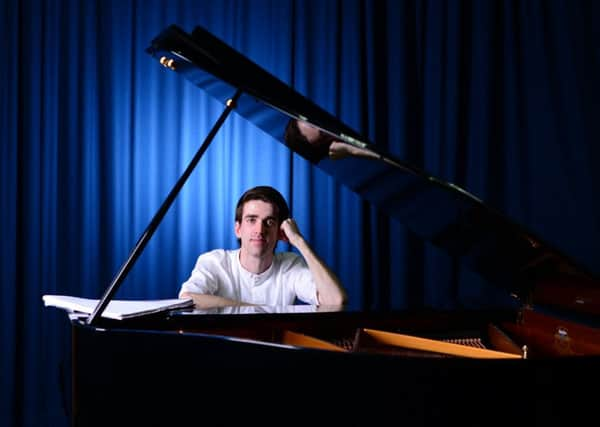Ones to watch in 2017 - composer Lliam Paterson


My first thought was that having this opportunity is absolutely brilliant. Then my second thought was: ‘yikes!’” It’s understandable that young Aberdeen-born composer Lliam Paterson might well feel somewhat daunted by his big project for 2017, given that it’s to write a half-evening companion piece for one of the darkest, most enigmatic masterpieces of 20th-century opera: Bartók’s one-acter Bluebeard’s Castle.
Paterson’s brand new work, The 8th Door, is set to be unveiled at the end of March as part of a striking Scottish Opera double bill, directed and conceived by Matthew Lenton of Glasgow theatre company Vanishing Point. It’s a high-profile project, one certain to bring Paterson’s music to a broader audience than ever before. And it feels like we’re in safe hands: he’s a composer who, despite his relative youth, has already amassed enormous experience, much of it specifically in the opera world.
Advertisement
Hide AdAdvertisement
Hide AdHe was just a teenager, though, when he began composing – and driven by curiosity. “I thought a lot of the modern music I was playing was really exciting, but I wondered: what would it sound like if I was writing it?” And during his studies – at St Mary’s Music School, Edinburgh, then Fitzwilliam College, Cambridge, and finally London’s Guildhall School of Music and Drama – he found himself drawn to opera. “My very first involvement in opera was when I was répétiteur for Britten’s A Midsummer Night’s Dream at Cambridge – it was quite a scary opera to begin with, but something about the connection between music and drama really struck a chord with me.”
Since then he’s worked extensively in the same role – as a rehearsal pianist who works closely with singers and knows the score inside out – and as a result has gained, he feels, invaluable insights. “One of the really key things I’ve learnt from my répétiteur work is how to write for the singing voice. It’s really difficult if you just read about it from a book – but actually experiencing it in the rehearsal room, and discovering what singers find hard or easy, how to move through the vocal registers in a comfortable way – that’s really shaped how I write for the voice.”
Paterson also studied privately with Judith Weir, since 2014 Master of the Queen’s Music, and herself a respected opera composer. Not surprisingly, he acknowledges Weir in his somewhat eclectic description of his own musical style: “I’d say at the moment it’s a bit of a mix of John Adams, some Judith Weir in there, hints of James MacMillan and Shostakovich, a bit of Louis Andriessen, and even some Britten too, and Jonathan Dove.”
Paterson became Scottish Opera’s Emerging Artist Composer-in-Residence in 2014: “It’s been quite unreal – it’s not often you come straight out of music college and have three years of full-time work as a composer.” As part of the role, he has his own office in Scottish Opera’s Glasgow HQ – actually the boardroom, which he vacates when it’s needed for weightier matters – and has already written short pieces for the company’s Opera Highlights tours, as well as a celebratory fanfare for the opening of the Theatre Royal’s new extension.
The 8th Door, however, is his biggest commission – and all the more daunting for Paterson as a long-time Bartók fan. “Bluebeard’s Castle has always been one of my favourite operas, and to be asked to write something to go alongside it is slightly terrifying – but terrifying in a good way.” Discussions are still under way as to exactly how this intriguing double bill will be staged, but Paterson’s new work – for six voices, though they’re not playing operatic roles, and orchestra – looks like it will make a provocative pairing.
Paterson hasn’t just been writing music for Scottish Opera of late: he wrote an Edwin Morgan song cycle, Spirit of the Place, for this year’s Aye Write! literature festival, and the Japanese-inspired chamber opera Spirit Harbour, which was premiered at the 2014 Tête à Tête opera festival in London. “I’ve also written a huge amount of songs,” he adds. “It’s almost like the composer’s equivalent of an artist’s sketchbook – to write a really interesting, dramatic scene in a short space of time.” It seems, for the moment at least, as if Paterson’s musical passions lead unavoidably to the opera stage – and he has other Scottish Opera commissions in the pipeline, although details are yet to be finalised. But with the high-profile premiere of The 8th Door as part of one of the company’s flagship productions, he’ll be a name to watch closely over the coming year. ■
*Scottish Opera’s new production of Bluebeard’s Castle and The 8th Door is premiered in Glasgow’s Theatre Royal on 28 March, scottishopera.org.uk